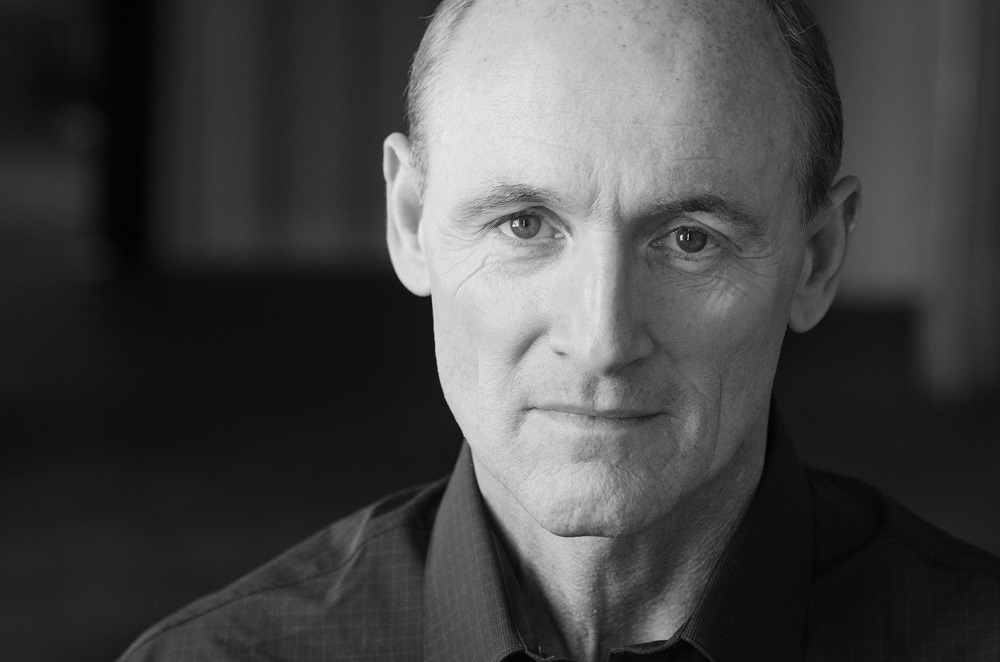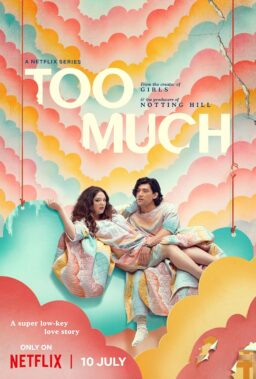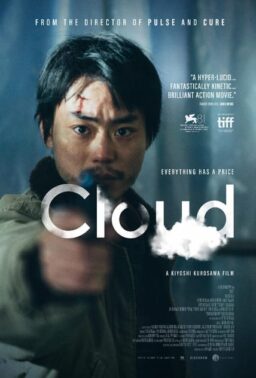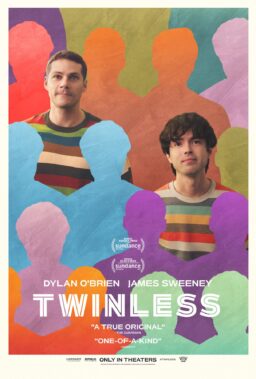In 2014, in his 17th season at the Stratford
Theatre Festival, veteran stage/film/TV actor Colm Feore tackled one of the
most difficult roles of any actor’s career, William Shakespeare’s King Lear. It
came after already claiming his place among the theater greats after playing
title roles in “Macbeth,” “Hamlet,” “Cyrano de Bergerac,” “Coriolanus,” “Romeo
and Juliet,” “Richard III,” and many more. Hailed by the Toronto Star as a
performance that catapults him “into the ranks of the world’s greatest living
actors,” the performance is now being used to launch a daring initiative on the
part of Stratford not just to bring the festival to people who can more easily
get to a movie theater than Canada but to capture all of Shakespeare’s plays on
film over the next decade. The first installment of “Stratford Festival HD”
plays at the Music Box Theatre in Chicago on Wednesday, February 25th,
and Feore sat down with us to discuss “King Lear,” the importance of theater in
his life, and the toll the emotional process takes on an actor.
You told The Toronto Star that this was “the hardest part to
play.” Could you elaborate? Why is King Lear the hardest part?
It’s the hardest part I’ve ever played because I knew that
going into it in order to make it worth people’s while—to ask them to come and
be worth the price of admission—I had to give them everything I understood to
date about how to do Shakespeare properly. I’ve done an awful lot of it. I
should know how to do it. The thing that’s hard is that I discovered that
instead of it being the best version of what I had learned how to do, it was
the “least encumbered” version of what I had learned how to do. I broke through
something that suggested I should chuck all the stuff I thought I knew and I
should just do this part simply. Let’s just do this play. Forget about what you
think you know about Shakespeare, and let’s see if you can learn something
about who this guy really is. Trust Shakespeare. If he’s an asshole in the
first scene, just be an asshole. There was no place in that journey to “plan”
or “orchestrate.” I finally realized that that’s not going to help me at all. I
had to just show up. The terrifying part of it is that I didn’t know if that
would work.

It comes through. I’ve seen and done a lot of Shakespeare,
and the first thing I thought when I saw this was that it was a very visceral
take on it. Words like anger or rage. People associate flowery language with
Shakespeare but in your very first scene, you are RAGING to the back of the
theatre. It’s a more primal take. How do you build up to that right from the
beginning of a three-hour play?
There IS NO build-up. Right from the beginning—the youngest
daughter says nothing and it’s all over. But if he doesn’t behave what appears
to be irrationally, foolishly, outrageously, all of the other actors are
screwed. Not only do they have nothing to act but their next lines are, “Have
you ever seen him this irrational?” “I’ve never seen him this crazy.” “I think
he might be nuts.” And so, the challenge is that it’s GOT to be that crazy. The
audience thinks “It’s Christmas.” (Big smile.) And before you know it, it’s “Off
with your head!” They have to be thrown back in their seats and think this is
nuts. The whole premise of the first scene doesn’t make any sense. He’s divided
a kingdom that he’s already divided back stage. Everyone knows it’s going to be
divided. Then he says he’s going to give a “bigger third” to one but, of
course, a third is a third is a third. One might be slightly bigger or better or
different. But the math is absurd. Really, it’s just a game. “DO YOU LOVE ME?
Which of you loves me more? I need lots of love and I need it now.” The real
love comes from the daughter who says, “You’re being an ass. Don’t do this
daddy. It’s dumb.” And had she had that conversation with him backstage before
they came on…but she does it in public. And she embarrasses him. And she
exposes him. And he simply loses it. I couldn’t find a poetic way to do it. An
arty way…
We’ve seen a more cerebral take on it. This is more primal.
Yeah. I thought the play was very primal. I went backward
from the ending. If, then. If Shakespeare wants us to feel anything for this guy
in the last moment of the play when he comes on carrying his dead daughter,
before he says a word, we have to have a gut response. This is not good. We’ve
seen the front cover of The New York Times and someone in the West Bank is
holding a dead child and your heart stops. You tear up. You think, “How do you
cope with this?” Our feeling is engaged immediately and it short-circuits that
cerebral response. “Lear,” the play, is all about an emotional response. That’s
the best way to get to us. We can discuss the themes later and the framework,
but the success or failure of the play comes down to that rooted emotion. So if
Shakespeare wants us to feel for him at the end and he’s behaved so abominably at
the beginning, what happens in between? I took those two as my cue. I would
give the other actors as much as I could, so they didn’t look like bad people.
His daughters are sometimes the “evil sisters.” They’re not bad people. I make
them behave badly. “I hope your womb dries up and falls on the floor.” Dad, did
you really say that? And, so, it takes horrific turns. And, yes, he thinks he’s
justified. And, so, the audience’s view is compromised because they can see it
from the angle of different characters. They begin to see the cracks. They know
where it goes wrong. Who really loves who and who doesn’t. That evolved slowly
as this guy pushes people to extremes. They don’t force him into the storm, he
CHOOSES to go.
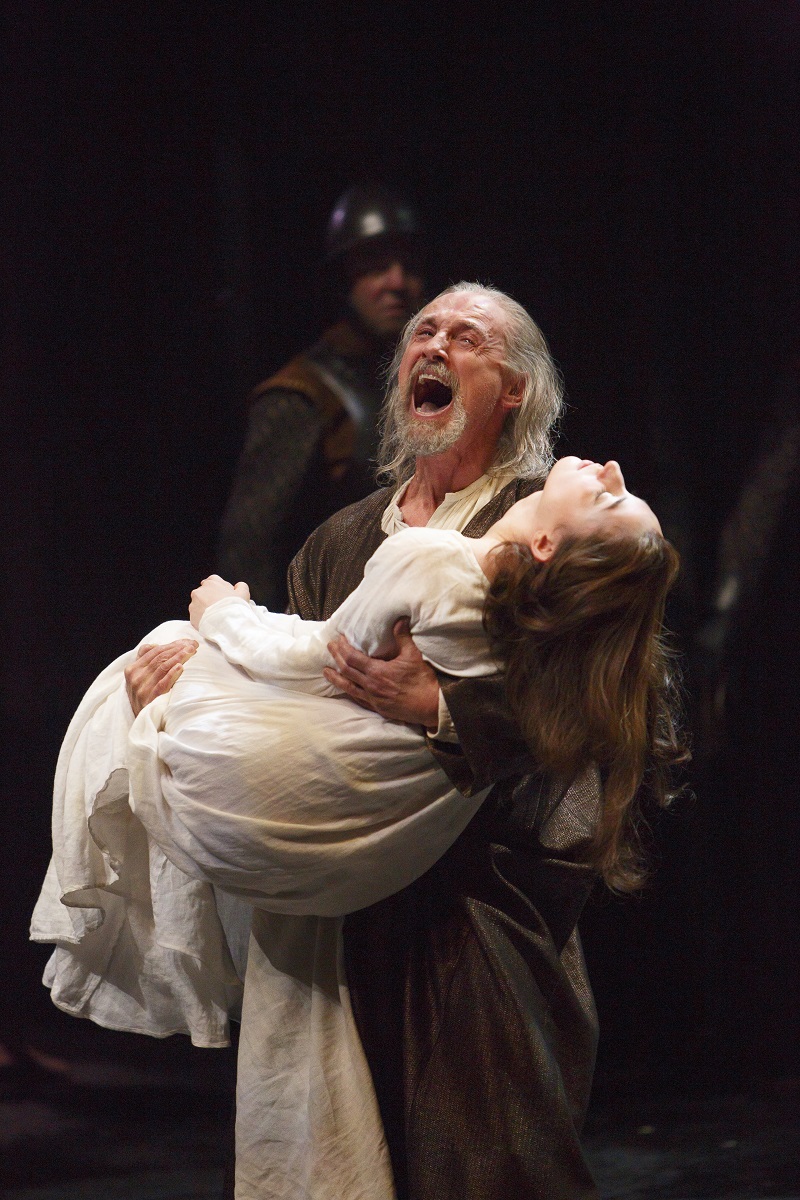
It also looks exhausting to me. It brought to mind a recent
appearance by Ethan Hawke on “The Charlie Rose Show” in which he discusses
Robin Williams and Philip Seymour Hoffman, two men he worked with, and how they
put so much into what they did that it left a bit of them there. He could see
that they would put all this emotion into a scene that it would leave them
drained, it would take a toll. Does doing this take a toll on you?
Yeah. I was shattered in the end. The voice was ragged. The
body was tired. But it was exhilarating at the same time. If you can make it
through, this is a marathon of feeling. I’m convinced that anything less just
wouldn’t work. The great advantage I had is that I didn’t have to do it 8 times
a week. Because of Stratford’s repertory system, I could do it like opera. I
could really chuck myself into it, leave everything there on the floor, and
walk away secure in the knowledge that I really didn’t have anything else to
say about it or give to it. I think Ethan’s right. Those actors are way more
engaged—God rest both of them—than I am, but it’s a mad pursuit to inhabit
other creatures.
Especially the dark ones.
Well, the dark ones are the most interesting. It’s very
therapeutic. You tear yourself apart trying to meet the demands of that particular
character. And if you throw yourself into good writing, it pokes all the right
holes in you and you find that you’re messed up. I had to cheat with myself. I
would be backstage trying to prepare the last scene. I knew that I had to not
think about the things that I had thought about before the light went off and I
was to go or it would be too soon and I would peak off-stage. I had to think
about the weather or something else and then I would need a few zen moments to
go, “Now. I’m ready.” I would know what breath to take. I didn’t even plan the
sound I would make but I planned to have a thought that would trigger a sound.
I planned to have an emotional response. Every night that image in my head
would change. And that image would have to be fresh. So I would take things
from the headlines. Anything that was going on in our real life at the time
that really did push people to the edge.

It would be different each time to provoke a more instinctual
response?
Yeah. Now that’s it over, I can tell you one that I had
difficulty with. There were three Israeli kids killed by someone, and, in
retaliation, the Israelis grabbed a kid, a 16-year-old, and burned him alive.
When I heard about that, I got choked up. Obviously. I have children. I imagine
the child’s father when the authorities came to the door and said, “This is
what’s left of your son. This is what’s happened. And this is how it happened.”
Imagination is the only tool I got but I could only imagine the despair that
this man felt. And I had found over the course of my research a lot of
wonderful poetry. Lines that would bubble up…I tend to think things happen for
a reason. If something floats into my consciousness, I’ll write it down. I just
became aware of that and I might need it. There was some line from a famous
poet…it might have been Cervantes…it was about the wasted tears of a man who
sees his child hanged. This is what Lear’s going through. This is what he’s
trying to explain. You let this happen. I couldn’t stop it. I killed the guy
who was doing it. Even at my advanced age. You need to reinvent the wheel and
reinvent the things that get you going.
It’s fascinating to me that it’s from such a variety of
places—news stories, poetry, theatre.
And I have an 18-year-old daughter. Beyond imagination,
that, like any muscle gets fatigued. You have to find a way to rest it and
rejuvenate it. Like Pavlov’s Dog, I trained myself to be at a certain emotional
pitch at the entrance JUST before I would go on.
Have these tools served you well as a film and television
actor as well? Are you different in those fields because you’re such a vital
theatre actor?
I think so. I also took up cameras and photography because I
was trying to figure out what would be seen in 35mm, etc. What kind of
information is being captured, and, therefore, what kind of acting do I have to
do? Building this “technical facility” using myself as the raw material—I’m
still controlling the experience—which goes back to the first question: The
reason in “Lear” it was the hardest thing is because it was the “purest” thing.
I’ll learn it all. I’ll plan what I can plan. And then I’m going to go out and
not know my first line. And I’m going to take a deep breath and see what
happens. I’m just going to be here and listen. Well, that’s the best thing for
film. Just be and let the cameras capture what’s going on in your head. I found
that all of these experiences have cross-pollenated and helped each other—certainly
in giving me confidence to do it. When I went away from Stratford in the early
days and tried film and television on for size, I learned things from great
directors who guided me to simplicity. Don’t do so much. Be simple. I took that
simplicity back to the theatre. It created in me a kind of stillness and a
centeredness. Just do one thing that makes sense and is organic, rather than
play-act. “Lear” ended up being both the hardest and most exhilarating thing
that I did.
Is this version people can see in theaters a “typical night”
or does the process of filming change it?
It has the added excitement in terms of the audience and the
actor’s expectations. We know there’s a certain historical, archival quality. “Oh
my God, we’ve got one take.” But we’ve also always got one take in front of an
audience that’s paid. It’s the real deal. It’s really like being there. I just
figured the camera was like another audience member who happened to be holding
a camera. My knowledge of cameras helped. Knowing where cameras were placed and
how to use them to my advantage. But we didn’t change anything else. In order
to get over the nerves and terror, I was very much encouraged that the company had
gone with the notion that every day we’d try something new. That stage is very
organic. It’s very three-dimensional. If I go down right, my friend would go up
left. We’d do this deliberately—we’d just change the blocking. We always knew
how we needed to end up. It gave it a thrilling, organic spontaneity. It
frightened us into a new freshness.

